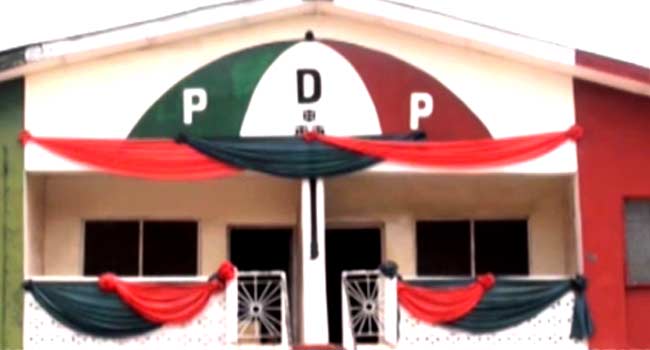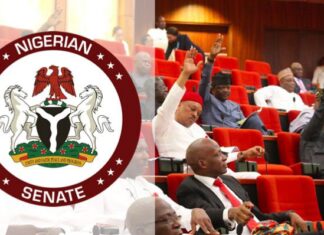By Emeka Alex Duru
Perceptive analysts may be right in their observation that at no time had the country’s opposition politics lacked colour and focus as it is with the Peoples Democratic Party (PDP). Smarting from the its disastrous outing in the 2015 general elections, the party had claimed to have learnt its lessons and had actually made moves that suggested genuine thirst to return to power. Many had consequently looked upon it to offer robust opposition to the All Progressives Congress (APC). Part of the expectations was that the PDP would offer Nigerians alternatives to the ruling party in terms of policies and pronouncements. But five years as the leading opposition political party in the country, PDP is yet to articulate policies and programmes for its present status. If anything rather, the party is yet to find harmony within itself. At each point in its activities since the 2015 elections, PDP has sent out fears of imminent extinction on account of estrangement that has hit members regularly.
Central in the incidences of uncertainties in the party are factors of imposition, sabotage, non-commitment and outright indiscipline among the ranks. Consequently, at critical points when the party had been expected to rise up with common voice, the various tendencies in its fold, had responded in divergent tones.
PDP at war with self
In the run-up to the last general election, emergence of Atiku Abubakar as Presidential candidate and Peter Obi as his running mate, almost tore the party apart. Some governors on its platform had rooted for their Sokoto State counterpart, Aminu Tambuwal as the flag bearer. When, against their permutation, Atiku emerged the winner at the Port Harcourt national convention, they almost walked out on the party but for spirited intervention by concerned elders. Rivers State governor, Nyesom Wike, was prominent in the open manifestation of disgust. Obi’s challenge essentially came from his South East kinsmen who claimed not being consulted on his choice. Even when the rampaging camps were prevailed upon to sheathe their swords, subsequent developments indicated that they did so reluctantly as they merely played marginal roles in the campaigns.
Before then, the breezy emergence of Uche Secondus as the National Chairman, following strenuous tussle for the soul of the party with the rival Ali Modu Sheriff faction, had alienated the Ahmed Maikarfi camp which had held the party intact while the crisis lasted.
Concern over Kogi, Bayelsa
Similar incidences of discontent resonate at the state chapters of the party. Barely two weeks to the November 16 governorship elections in Bayelsa and Kogi, the state wings of the party, are in various forms of crisis. In Kogi, the emergence of Ahmed Wada as the flag bearer has seen members sympathetic to Senator Dino Malaye feeling betrayed by the party. In fact, to underscore the level of disquiet in the party, Malaye has turned down his appointment at the leader of the Wada election campaign. Incidentally, the Senator is equally going for a court-ordered repeat election with Senator Smart Adeyemi of the APC for Kogi West senatorial district. It is therefore yet to be seen how the PDP can successfully go into the election on these fractured limbs.
In Bayelsa, the situation is not different. Since the emergence of Senator Douye Diri as the candidate for the election, the state wing of the party has literally been drawn on warpath by some members who felt short changed in the primary. Former Presidential Adviser on Amnesty, Timi Alaibe, one of the aspirants, has even taken the party to court over the primary and its outcome. There are other instances of animosity within the party’s leadership, elsewhere.
Nigeria bears the brunt
Thus, burdened by internal contradictions, the PDP has not mapped for itself precise direction and dimension of its opposition engagements. The immediate result is that the political space has been largely left open for the APC that apparently seems merely interested in latching onto power without an agenda on what to do with it. In the process, the country has remained in its current state, 20 years after the inception of the present civilian dispensation. The danger in the PDP nonchalance is that an attitude of impunity by the APC and its elected officials, is gradually becoming the norm in the country’s body politics. Until the PDP fell from power in 2015, the lethargy by the opposition had not been this pervasive. For instance, there was the Conference of Nigerian Political Parties (CNPP), an amalgam of over 21 political parties that had come together in what was advertised as an attempt to check the excesses of the PDP. Prominent members of the CNPP were the then All Nigeria Peoples Party (ANPP), Alliance for Democracy, AD, (later Action Congress, AC ), Peoples Redemption Party (PRP), and All Progressives Grand Alliance (APGA). There were other parties. Though each party had its own agenda and in that case essentially in competition with one another, they had collectively pledged to down play their individual differences in an effort to provide a united front against the perceived hegemonic tendencies of the PDP. When some of the parties fused into the APC in 2014, the party gave the PDP serious opposition, even when many were of the opinion that it was more engaged in propaganda than squarely addressing critical issues. But with the table turning and APC being in power, the PDP has not even provided any opposition of whatever form.
The fear among concerned Nigerians is that the result of the likely collapse of opposition is that the country may be denied the benefits of alternative view points on major policy issues. This frightening scenario may be the first of its kind in the country’s democratic enterprise since it gained political independence in 1960, analysts say.
Opposition in history
During the First Republic, for instance, a working arrangement between the then Northern Peoples Congress (NPC) and the National council of Nigeria and Cameroon (NCNC), found the Action Group (AG), playing the role of the opposition. The tenacity of the AG in checking the perceived excesses of the NPC/NCNC coalition was said to have ensured that balance was observed by the authorities of the time.
Second Republic democracy did not explicitly create room for opposition politics. However, in the first leg of the dispensation (1979-1983) following a coalition between the National Party of Nigeria, NPN and the Nigerian Peoples Party, NPP, the Unity Party of Nigeria, UPN with tacit backing of the PRP and Great Nigeria Peoples Party, GNPP, unofficially acted as opposition parties. By 1983 however, the NPN/NPP Accord had hit the rocks forcing the NPP to join ranks with the other parties to form the Progressives Grand Alliance that acted as the fulcrum of the opposition. As in the First Republic politics, opposition parties of the Second Republic were credited with playing great role in stabilizing the polity.
Danger looms
The fear being entertained by keen followers of the gradual demise of opposition politics under the PDP is that the nation may unwittingly be gravitating to a one party system with its corresponding civilian dictatorship.











